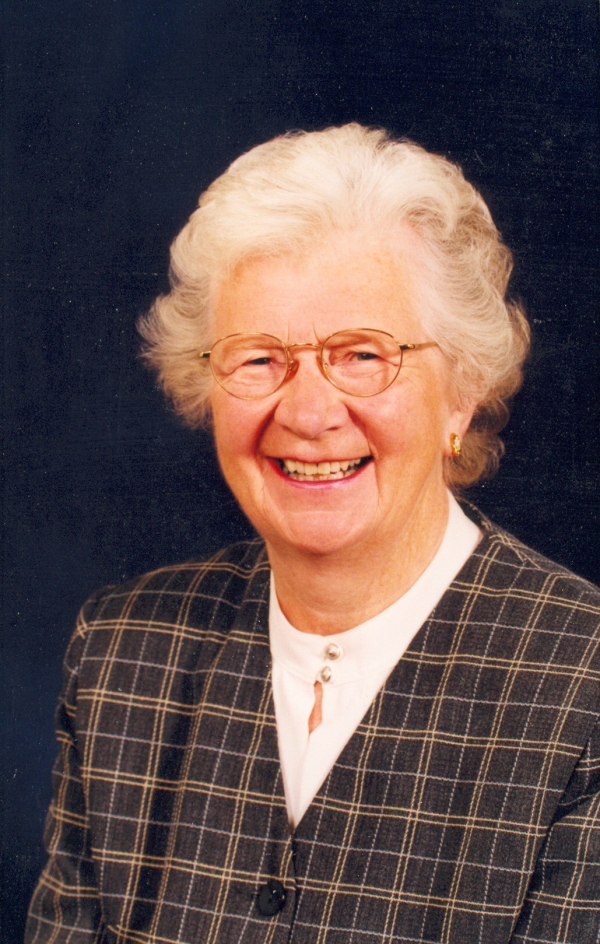Gradually as more female players were being invited to join the championship bands, and making their own distinctive mark and presence felt, the same could not be said for ladies taking up the baton.
Looking through the record books very few ladies have conducted the winning band at the very highest level. In fact one of the first and rare occasions was in 1978 when Betty Anderson conducted Ratby Band of Leicestershire to first place at the Grand Shield contest at Belle Vue, Manchester.
Betty can remember, as if it was yesterday, at one of the rehearsals the week before they made their journey to Manchester. She told her band ’...you can win this competition...’ and of course they did.
Looking back over the journey she had from being a young horn player to winning the Grand Shield and meeting legendary brass band figure of Harry Mortimer at their bandroom, her life has been filled with many magical musical moments .
Betty was born in Leicester, into a family that was part of the Abraham Orsini .Anderson, knitwear company, which had been started by Abraham in the front room of his home as a freelance Bag Knitter.
Betty’s father Jim worked in the knitwear business, whilst her mother Ada ran the family home. Betty had three brothers, the eldest, Bernard died when she was 19 years old but was by all accounts had been destined to be a fine trombone player.
Neither of her two remaining brothers were musically inclined, so it was left to Betty to follow in her father’s footsteps as a brass instrumentalist. Like her father she became a tenor horn player, and it was likely that her two non musical
brothers were proud of the achievements their sister had made, particularly when she came home from solo contests with cups and medals, however, the downside for them was her incessant home practice.
Betty’s father Jim, was a member of the now defunct Imperial Band, and was considered to be a good horn soloist, her grandfather was also a horn player in the Leicester Highfields Band, and her Uncle Charles was a very well known conductor and adjudicator during the 1930s and 40s.
In her early years one of her musical heroes was Harry Mortimer, whom she met when she was eight years old. In 1938 she was one of only four female entrants in the national solo competition. Over the last 70 years Betty has witnessed many changes in what was a traditional male dominated genre. She was entering solo contests almost every week, and on more than one occasion the remarks from the judge assumed it was a male player. On one particular occasion Harry Heyes, a well known brass band conductor in the Midlands, (who was hidden away from being able to see the player during their performance) remarked before announcing the winners about Betty's performance’...this boy plays like a man …’ , so unusual was it for a girl to be taking part.
The first solo competition she entered was barely five weeks after she had started to play. She was placed 4th in the under 16 class, playing Sweet and Low, and came away with the prize of 2s 6d (12½p).
At the age of eight she met the legendary Harry Mortimer for the first time, her father knew him when they met on the slow melody and solo contests circuits, 'HM', became a good friend of the family. he was to become Betty’s greatest musical hero, and says to this day that every time she heard him she learnt something new each time.

In 1944 she made her first broadcast in a programme that was devised by Harry Mortimer, for younger musicians. She also went on to play solo performances accompanied by bands such as Black Dyke Mills and Foden’s.
By the age of 12 she had decided that conducting was something that she wanted to do even more than play. At the age of 14, her father was the conductor at the local ATC Band. but with so few young lads in the band and all they wanted to do was play the melody there was no one available to play the play the bass, so Jim took it on and handed his baton over to Betty who then conducted the band for the remainder of the rehearsal.

Betty at the age of twelve, playing alongside her father, Jim Anderson
As the early years of conducting slipped by, she began to miss playing, and took the opportunity of joining an up and coming band at the time, the Leicestershire based Kibworth Band, which in those days was conducted by William (Bill) Scholes..
It was as a member of this band that she first met Professor Walter B. Hargreaves, who came to help prepare the band for the big contests. Betty recalls that his rehearsals was as good as lesson on how to actually rehearse a band. The first he did was to sling all the players to all four corners of the bandroom, with suitable comments about their ability !!! and then the band had a break, then he would bring all the players back together again.
Betty often wondered if they would bother to come back at all having been told they were rubbish, but come back they did and enjoyed every minute of it. The contest results the band achieved with his help and Bill Scholes leadership were quite staggering.
Straight into the top section and five successful Area results and qualification into five National Championship Finals in succession, (1965 through to 1969). The first one was just two years after the band had played in the third section. She stayed with the band for ten years and then moved to Ratby Band as their new conductor.
Betty was still working at the family business, often seven days a week, to ensure the orders from customers went out in good time.
At the age of 50 Betty took a very big gamble, to retire from her job, which she felt would enable her to give much more time to her music. Could she do it?, taking into account that she would not receive a pension for another ten years. Over the years she had been asked, begged and approached by not just young players for private lessons but older ones too, as well as many parents asking on behalf of children. Between her 50th and 60th birthday she looks back as being some of the happiest and busiest years of her life in brass bands. It was a time when the number of youth bands was on the increase, and a never ending number of parents wanted their children to join a band, work for Betty was plentiful.
As the conductor of Ratby Band, a band that was in the ascendancy she began to attract a lot of publicity being one of the few female conductors of a brass band. One of the assets Betty seemed to have over some of her male counterparts, was that whilst Ratby was only a small community. Betty got more involved in some of her players personal problems. Some of these would be having an effect on the players performance. It was once said that banding itself has an important social function and in this respect it often helps as an anecdote to all manner of problems. But then on the other hand some may argue that these can also create a few problems as well. However, Betty has always considered that helping to sort out the problems that may arise in her band was part of her duties as a conductor.

The image of Betty with the Ratby Band was the first photograph of a female brass band conductor taken by The Times 1970 (Courtesy of The Times)
’Did she ever experience any problems as a female in a slowly changing male dominated musical genre..?’ No, she is very quick to answer. It never occurred to her there would be any problems. She never experienced any special treatment and certainly never got any. In the early dayswere of course the days when she was the only female player in the band, mind you having her father as the conductor did help.
However, there was perhaps just the one occasion when she did receive some special treatment, this was during her years at Kibworth Band. When she joined there was a rota for tidying up the bandroom after the rehearsals, but for some reason she was never asked to be part of the rota, and decided not to ask why.
There was one incident worthy of a mention, only because it would simply not happen these days. It was when she was first appointed the conductor of the Imperial Band. The band was playing in the bandstand in the grounds of the De Montfort Hall in Leicester and one her brothers was in the audience. He overheard a lady sitting behind him say to her friend, ’Have you noticed—there’s a girl conducting the band’. ’Yes’, said her friend, ’I have been watching her and she seems to know just as much about the music as the players do…’, Betty has always considered that remark as very encouraging.
By the early 1970’s, Betty Anderson was Musical Director at Ratby Band and the goal was strengthening the band and reaching the Championship Section. The band won, amongst other competitions, the prestigious W & H O Wills Contest at Kensington Town Hall. In 1973 the Junior Band (now the Youth Band) was formed, under the baton of Betty.
In 1978 the Ratby Band won the Spring Belle Vue Grand Shield competition enabling them to compete against the best bands in the country at the famous British Open Championships. At this time Betty had the distinction of being the first female conductor ever to take the stage at the British Open Championships . The meteoric rise of the band under Betty’s direction saw them promoted from the 4th section through to the championship section within 11 years. In 1982 she retired from conducting on a full time basis and went onto enjoy her role in youth work particularly as chairman of the National Youth Brass Band from 1974 to 1994.
Looking back over her career, and thinking about all the friends she has made over a lifetime in brass bands, the wonderful experiences that she has had and is still in the world of brass bands. From all her achievements and there have been many, the one that stands out above all else is conducting on Saturday 9, September 1978 at the Kings Hall at Belle Vue, Manchester in the British Open Championships and up against some of the best bands in the country.

Having won the Grand Shield in 1978, Betty asked her old friend Harry Mortimer
if he would come along to the bandroom so this special photograph could be taken
She recalls looking at her back row cornet line, just as she was about to bring the baton down on that year’s test piece Benvenuto Cellini, and suddenly realised they were all from the Junior Band, which she had started in 1973. Not one of them was yet 14 years old, in fact looking round her band very few were over the age of 17. Her pride in what she and this village band had done, in moving up from being a struggling 4th section band to perform and take part in this company at the Kings Hall, a place considered by many followers, the Mecca of brass banding, was a tremendous feat.
In 2002 she was once again at the British Open Championship, this time at the Symphony Hall in Birmingham, where she was presented by the Worshipful Company of Musicians the Mortimer Medal. She was later invited to be presented with it by the Master of the Worshipful Company at their meeting held in London.
Betty Anderson, led the way to what brass bands are today, she joined as one of only a handful of female players and even less than that who took up the baton. Many others have since followed in her footsteps, perhaps one day Betty will see the day when a female conducts the winning band at the British Open or the National Championship final.
We were delighted and honoured when the legendary Betty Anderson accepted our invitation to conduct “Boobs & Brass” at their 2007 annual concert. The programme consisted of light, popular pieces including The Pink Panther. Betty put us through our paces but she was not too sure about our `real live panther` but after a little persuasion, we convinced her it `would be alright on the night` and it was! This `anonymous` trombone player emerged from the shadows, attired in a very pink outfit and crept up to join Betty. After a few wiggles and even a cuddle for Betty, – I think she had lost her heart to him – just a little.
The girls gave this wonderful lady their avid attention and the respect that she deserves and we were very proud to make her our newest “Boobie”. She led us through another evening of great music making and we hope that her first experience of conducting an all female band did not disappoint.

The members of the Boobs and Brass Band seen here at Butlin's in 2010
Lesley Bentley, the Secretary of the Leicestershire Brass Band Association told 4BR: "Betty was a true pioneer — a wonderful musician and person. She was also for many years a mentor and friend to many bands in Leicestershire and for over 20 years was the President of the Leicestershire Brass Band Association.
Many young players owe their training and interest in brass bands to this remarkable woman. Her lasting legacy is the fine condition of brass banding in the East Midlands."
Chris Helme




















